|
|
|
Sort Order |
|
|
|
Items / Page
|
|
|
|
|
|
|
| Srl | Item |
| 1 |
ID:
133411
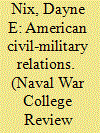

|
|
|
|
|
| Publication |
2012.
|
| Summary/Abstract |
Samuel P. Huntington died in December 2008, but this Harvard academic continues to have a significant impact on the conduct and state of American civil-military relations. Mackubin Owens's recent US Civil-Military Relations after 9/11: Renegotiating the Civil-Military Bargain and Suzanne Nielsen and Don M. Snider's 2009 edited work American Civil-Military Relations: The Soldier and the State in a New Era both challenge and contextualize Huntington's work for contemporary theorists and practitioners of civil-military relations. This is indeed a worthwhile effort, as America's civil-military relations have received much "airtime" over the past few years. General Stanley McChrystal's seeming challenge to the political leadership over proposed Afghanistan troop levels, Lieutenant Colonel Andrew Milburn's Joint Force Quarterly article challenging traditional conceptions of civilian control, and Bob Woodward's revelations in Obama's War regarding the 2009 tensions between the Pentagon and the administration over Afghanistan strategy highlight the relationship between the military and our civilian leaders while raising the issue of the military's participation in political discourse.
|
|
|
|
|
|
|
|
|
|
|
|
|
|
|
|
| 2 |
ID:
130242
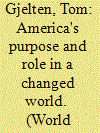

|
|
|
|
|
| Publication |
2014.
|
| Summary/Abstract |
The presidencies of George W. Bush and Barack Obama suggest what doesn't work in efforts to promote US influence in the world. By ordering an ill-conceived invasion of Iraq, Bush alienated US allies. His policies of secretly imprisoning Islamist militants and then subjecting them to "enhanced" interrogation and indefinite detention at Guantánamo struck Muslims everywhere as evidence of a war on Islam. Barack Obama, elected as the most explicitly anti-war president since Woodrow Wilson, came into office determined to undo the international damage done by his predecessor. "The walls between old allies on either side of the Atlantic cannot stand," Obama said in Berlin in 2008, and a year later, speaking in Cairo, he promised "a new beginning" with the Muslim world, with relations "based upon mutual interest and mutual respect." As promised, he withdrew US combat troops from Iraq. By 2013, however, Obama had fared little better than Bush in his global outreach. According to the Pew Research Center, support for the United States in Egypt, Jordan, Lebanon, and Pakistan was actually lower than it had been in the last year of the Bush administration. In Europe, the US favorability rating was higher than it was under Bush, but it had fallen steadily in the years since Obama took office, and it remained far below where it stood in 2000. One possible lesson from these years is that presidential personalities, speeches on foreign stages, and the changing international opinions of US policies matter less than we might think. Perhaps the most reliable measure of America's standing in the world is how appealing the country is to all those who are considering migration. Since 2007, Gallup surveys in more than one hundred and fifty countries have shown that the United States is far and away the number one favored destination. The most recent survey projected that one hundred and thirty-eight million people worldwide would like to move permanently to the United States, more than three times the number who would choose the United Kingdom, the second most favored destination. Those numbers show the United States still represents opportunity and promise to people around the world, and it is clearly in the US global interest to maintain that reputation.
|
|
|
|
|
|
|
|
|
|
|
|
|
|
|
|
| 3 |
ID:
125091
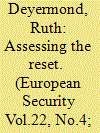

|
|
|
|
|
| Publication |
2013.
|
| Summary/Abstract |
Critics of the Obama administration's 'reset' with Russia claim that it has failed to improve bilateral relations and has conceded too much to Russia at the expense of American interests. In fact, the reset has delivered significant improvements in key areas and established the institutional basis for continued cooperation in the future, benefiting both states. Although disagreements remain on several important issues including missile defence, humanitarian intervention, and democracy, the reset has been broadly successful on its own terms, which were always limited in scope and based on a pragmatic recognition of the limits of possible cooperation. Future progress is uncertain, however - obstacles include differences of national interest; the complicating effects of relations with third party states and the impact of domestic politics. A continuation of the pragmatic approach underpinning the reset represents the best chance for stability in the US-Russia relationship.
|
|
|
|
|
|
|
|
|
|
|
|
|
|
|
|
| 4 |
ID:
130610
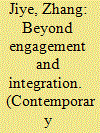

|
|
|
|
|
| Publication |
2014.
|
| Summary/Abstract |
As part of its new strategy of "retuming to the Asia-Pacific region", the A Obama administration has adopted some tough economic policies towards China, notably promoting the Trans-Paci?c Partnership (TPP) and attempting to establish new rules of international trade and investment aimed at strengthening economic ties with other Western countries through the Trans-Atlantic Trade and Investment Partnership Agreement(TTlP ), both of which tend to compress the geopolitical space for China's economic rise. The administration is also using a 'green barrier' to suppress the development of China's high-tech industry, and using economic diplomacy and investment restrictions against Chinese state-owned enterprises. This paper seeks to examine and analyze the causes of shifts in the U .S. economic strategy towards China.
|
|
|
|
|
|
|
|
|
|
|
|
|
|
|
|
| 5 |
ID:
132128
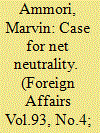

|
|
|
|
|
| Publication |
2014.
|
| Summary/Abstract |
For all the withering criticism leveled at the White House for its botched rollout of HealthCare.gov, that debacle is not the biggest technology-related failure of Barack Obama's presidency. That inauspicious distinction belongs to his administration's incompetence in another area: reneging on Obama's signature pledge to ensure "net neutrality," the straightforward but powerful idea that Internet service providers (ISPs) should treat all traffic that goes through their networks the same. Net neutrality holds that ISPs shouldn't offer preferential treatment to some websites over others or charge some companies arbitrary fees to reach users. By this logic, AT&T, for example, shouldn't be allowed to grant iTunes Radio a special "fast lane" for its data while forcing Spotify to make do with choppier service.
|
|
|
|
|
|
|
|
|
|
|
|
|
|
|
|
| 6 |
ID:
132991
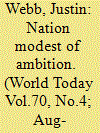

|
|
|
|
|
| Publication |
2014.
|
| Summary/Abstract |
It is oddity of President Obama's foreign policy that it is both unpopular and popular. On the face of it is both unpopular on the face of it, the polls reflect widespread disillusion. An NBC/Wall Street Journal survey conducted in June suggested that just 37 per cent of Americans approved of Obama's handling of foreign policy - an all time low for him. These findings prompt republications to talk of weakness and drift.
|
|
|
|
|
|
|
|
|
|
|
|
|
|
|
|
| 7 |
ID:
126683
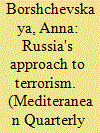

|
|
|
|
|
| Publication |
2013.
|
| Summary/Abstract |
A superficial look at Russia's current problems with terrorism and Muslim extremism may lead to the conclusion that the United States and Russia have similar views on this issue, which would therefore make them obvious partners in addressing the problems. Russian president Vladimir Putin promoted this position in the aftermath of the 11 September 2001 attacks in the United States and renewed this claim after the Boston Marathon bombing of April 2013. However, the Kremlin's view on terrorism is different from Washington's. The history of Russian domination and abuses in the Caucasus, the chaos and poverty that followed the breakup of the Soviet Union, and the Kremlin's human rights violations in Chechnya in many ways contributed to the rise of terrorism and Muslim extremism in Russia. In addition, the Kremlin uses terrorism as an excuse for an increased crackdown on civil society and for the lack of democratization in Russia. The Barack Obama administration therefore should have no illusions about the limitations on US-Russian cooperation on terrorism
|
|
|
|
|
|
|
|
|
|
|
|
|
|
|
|
| 8 |
ID:
132110
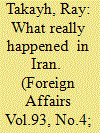

|
|
|
|
|
| Publication |
2014.
|
| Summary/Abstract |
Back in 2009, during his heavily promoted Cairo speech on American relations with the Muslim world, U.S. President Barack Obama noted, in passing, that "in the middle of the Cold War, the United States played a role in the overthrow of a democratically elected Iranian government." Obama was referring to the 1953 coup that toppled Iranian Prime Minister Mohammad Mosaddeq and consolidated the rule of the shah, Mohammad Reza Pahlavi. Obama would go on to remind his audience that Iran had also committed its share of misdeeds against Americans. But he clearly intended his allusion to Washington's role in the coup as a concession -- a public acknowledgment that the United States shared some of the blame for its long-simmering conflict with the Islamic Republic.
|
|
|
|
|
|
|
|
|
|
|
|
|
|
|
|
|
|
|
|
|